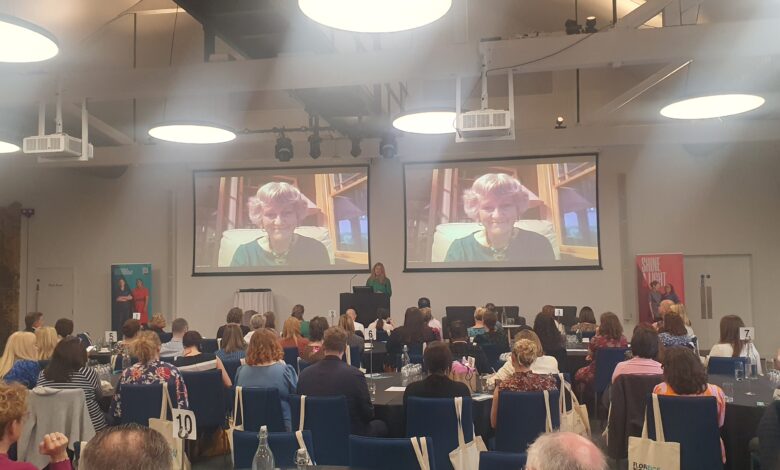Nurse-led quality improvement projects celebrated by CNOs

Nurses and midwives have presented the conclusions of dozens of quality improvement projects that they led as part of a scheme to prepare them for senior leadership.
Support for rural advanced practice, racial equality in midwifery and research parity for nurses with doctors were among the projects undertaken by Florence Nightingale Foundation (FNF) Academy scholars.
On Tuesday, the FNF held its annual conference to mark the conclusion of its scholarship programme, which mentors senior (band 7 and above) nurses to become change-making leaders in the health service.
Some of the country’s most senior nurses joined those on the scholarship programme at the event to celebrate these quality improvement projects – and to discuss priorities for the profession.
Dame Ruth May, chief nursing officer (CNO) for England and an FNF scholarship alumni, said she was “really proud” of the projects that had been conducted by the scholars.
CNO for Wales Sue Tranka also congratulated them on their work, and was also joined by Scotland CNO Alex McMahon, Maria McIlgorm, CNO for Northern Ireland, and Ireland’s chief nurses Rachel Kenna.
After a morning session on the need for nurses to lead on sustainability, the more than 100 scholars attending the conference presented their own projects.

Teddie Potter (on screen)
One set of presenters – all of whom are very senior nurses and midwives in the NHS – showed off ambitious quality improvement projects which impacted, in some cases, entire regions of the country.
Gordon Elder, regional chief nursing information officer (CNIO) for North East Yorkshire, said he had worked on improving digital inclusion in his trust – either due to lack of access, education, or other issues like generational gaps.
Mr Elder told delegates that digitisation in the NHS risked “vulnerable” groups being excluded or exploited, should outreach not be done.
“If we don’t get it right, we will make health inequalities a chasm,” he said. “We will leave people behind.”
Naomi Ellis, director of safeguarding and clinical standards at NHS Sussex, presented her quality improvement project around safeguarding standards for social care providers in her area.
The project was, Ms Ellis explained, in response to some social care providers not giving nurses enough input and standards slipping as a result.
Ms Ellis oversaw standards drafted up and implemented across care settings to mirror that of NHS healthcare providers.
“If we don’t get it right, we will make health inequalities a chasm. We will leave people behind”
Gordon Elder
These included better standards for accountability and data sharing, as well as designated doctors and nurses for safeguarding specific people under social care.
She said that the project had been such a success in raising local standards that the Care Quality Commission had started using it as a model to judge providers by, and that neighbouring trusts in Kent and Surrey were now adopting it too.
Midwifery also got a spotlight at the FNF event. Shereen Nimmo, group director of midwifery at Barts Health NHS Trust, led a project to improve the experiences of Black and minority ethnic (BME) women accessing maternity services.
The project also aimed to improve the experiences of BME staff, many of whom were arriving to work “expecting to be racially abused”. “Maternity has not been a happy place,” Ms Nimmo said.
“It’s the worst I’ve known it and at every turn midwives are being told they’re not doing enough, that women are having poor experiences. And I wanted to look at what the would mean for North East London.”
Ms Nimmo set up a programme to adopt a human rights-based approach for maternity training in her area.
This included surveying BME women in her trust area to fund out if they felt they were being listened to, and treated with dignity, multi-disciplinary training sessions, and other improvements within wards.
Ms Nimmo said it was a “work in progress”, and that it would continue working alongside childbirth human rights charity BirthRights to administer the improvements.
Similarly, Wendy Olayiwola, national maternity lead for equality at NHS England, spoke about a project that she ran nationally to create guidelines for “respectful, inclusive and attentive” maternity care.
“In maternity, equity is talked about less,” she said. “We just get on with it, but women from Black, Asian and other ethnic groups are dying as a result [of health inequality].
“When my role was created, I saw that a Black woman was five times more likely to die in childbirth, an Asian woman four times, and mixed race women had a higher risk too – and so did their babies.”
The toolkit, Ms Olayiwola said, provided resources for leaders and midwives on how to implement more culturally-sensitive maternity care.
Meanwhile, Dr Rachel King, a nursing academic with the University of Sheffield, presented findings on the needs of advanced nurse practitioners based in rural areas, such as the far north of Scotland.
In addition, Dr Barbara Farquharson, an associate nursing professor at the University of Stirling, led a quality improvement investigation into the funding of research conducted by nursing.
Dr Farquharson said she found that nurses were leading less than 10% of the funded research projects by the National Institute for Health Research (NIHR), with many overlooked in favour of medical research.
Dozens of other projects from across nursing and midwifery were presented, from retention projects for international nurses to many on sustainability in hospital wards and social care.

Dame Ruth May (middle) alongside Sue Tranka and Professor Greta Westwood at the FNF event






